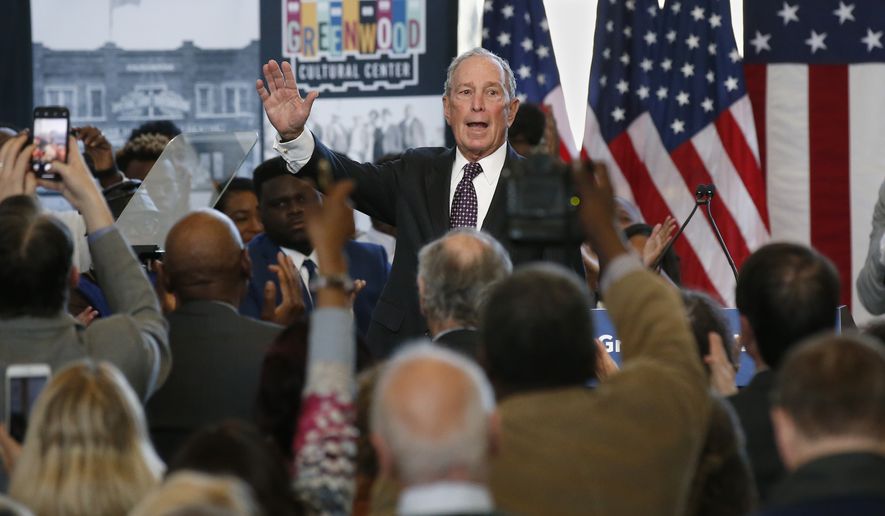Billionaire media mogul Michael R. Bloomberg has beefed up his staff with more paid employees than the front-runner, former Vice President Joseph R. Biden, embarking on the unconventional strategy of sitting out the first four nominating contests and then sweeping in for the kill on Super Tuesday.
The former New York City mayor has hired 800 employees in 30 states since jumping into the race less than two months ago.
He has 300 paid employees working in the campaign headquarters in New York’s Times Square. The other 500 are scattered across the country, mostly in the Super Tuesday states that vote March 3.
The campaign is heavily focused on North Carolina, Michigan, Wisconsin, Texas and California, a Bloomberg aide told The Washington Times.
Michigan and Wisconsin are critical swing states but not part of the 14 Super Tuesday states where Mr. Bloomberg is making his big bet. Michigan’s primary will be on March 10 and Wisconsin’s on April 7.
In addition to North Carolina, Texas and California, the other states voting March 3 are Utah, Virginia, Vermont, Arkansas, Alabama, Colorado, Massachusetts, Tennessee, Minnesota, Maine and Oklahoma.
Mr. Bloomberg is prepared to spend $2 billion of his fortune to defeat President Trump, according to a Wall Street Journal report.
He has already spent nearly $200 million, more than any other campaign. TV ads blanketing the country quickly boosted his standing in the polls.
Mr. Bloomberg in fifth place nationally with 7.0% of the vote. Mr. Biden is ranked on top with 28.4%, according to the Real Clear Politics average of national polls. Sen. Bernard Sanders of Vermont is in second place with 20.8%, Sen. Elizabeth Warren of Massachusetts is in third with 14.8% and former Mayor Pete Buttigieg of South Bend, Indiana, is slightly ahead of Mr. Bloomberg in fourth place at 7.2%.
Mr. Bloomberg dwarfs his rivals with paid staff. Mr. Biden, by comparison, has about 400 paid campaign workers.
“The real issue is not the number of paid campaign staff working for a candidate but the number of volunteers,” said Richard Anderson, a political science professor at the University of California, Los Angeles. “Volunteers who put in time for a candidate without being paid — that demonstrates that somebody is committed to a candidate. Bloomberg hires so many because money is his only resource.”
Scott de Marchi, a political science professor at Duke University, said Mr. Bloomberg’s focus is on states that vote in March because that is when a large chunk of the primary votes are cast. He noted that Ohio and Florida voters also go to the polls that month.
“It’s pretty clever, and it’s made possible by having an independent fortune,” said Mr. de Marchi, noting that Mr. Bloomberg is self-funding his campaign and accordingly not beholden to donors.
Democrat Al Gore in 1988 and Republican Rudolph W. Giuliani in 2008 tried the Super Tuesday strategy. Both failed to gain momentum and eventually dropped out of the race.
A risk for Mr. Bloomberg is that the leadoff contests in Iowa, New Hampshire, Nevada and South Carolina establish a clear front-runner who garners the attention of news media and voters ahead of Super Tuesday.
If a clear front-runner doesn’t emerge, then Mr. Bloomberg will have the advantage of months of saturation of TV airwaves.
However the states divvy up the primary votes, Mr. Bloomberg’s self-financed campaign will last as long as he wants to keep paying for it.
The other candidate with deep pockets, billionaire liberal activist Tom Steyer, has the same staying power but has opted for a traditional run that focuses on the first four contests.
Both of the billionaires could stay in the race if none of the candidates secures the nomination and it goes to a brokered Democratic National Convention in July in Milwaukee.
Some Washington pundits have speculated that Mr. Bloomberg is aiming for a brokered convention, where he can make the case that he is the best-suited Democrat to defeat Mr. Trump.
Mr. de Marchi said he doubts Mr. Bloomberg is aiming for a brokered convention.
“I don’t see either regular delegates or superdelegates becoming enthusiastic for Bloomberg unless he’s the only moderate left standing. He’d have to win outright,” he said.
• S.A. Miller can be reached at smiller@washingtontimes.com.
• Alex Swoyer can be reached at aswoyer@washingtontimes.com.




Please read our comment policy before commenting.